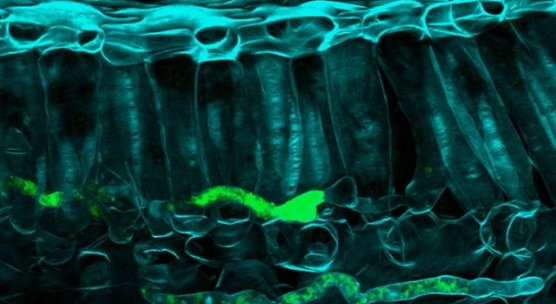Dundee-China collaboration discovers potential ‘Achilles heel’ of potato blight
Published On Tue 2 Feb 2016 by Grant Hill

Scientists working in Scotland and China have uncovered a potential Achilles’ heel in the organism which causes potato blight, a global problem with associated costs estimated at $6billion around the world every year.
Blight was the cause of the infamous Irish potato famine in the nineteenth century and remains a huge problem around the world, particularly as more countries turn to potato as a major staple crop and ramp up production. China is now the world’s major producer of potatoes.
Scientists at the University of Dundee and James Hutton Institute in Scotland have been working with colleagues at Huazhong Agricultural University, Wuhan, and Heilongjiang Academy of Agricultural Sciences, Harbin, to study ways to prevent the disease.
They have identified a potato enzyme that, if it were removed, could prevent the disease from taking hold.
Professor Paul Birch, who works at both the Division of Plant Sciences at the University of Dundee and the James Hutton Institute, explained, “The potato blight organism seeks help from its host, potato, to cause disease. It does this by creating an association with a host phosphatase enzyme in the potato to form a new holoenzyme that suppresses immunity.
“Once immunity is suppressed, then the blight can take hold in the potato. What this means is that this makes the potato PP1c phosphatase a susceptibility factor – a potato protein that is required for Phytophthora to cause infection.
“This gives us a new avenue to explore to develop a potato crop that would be resistant to blight, something that has potentially huge implications for global food security.”
The Dundee-China paper is published in the Nature Communications journal.
NOTES TO EDITORS
The University of Dundee is the top ranked University in the UK for biological sciences, according to the 2014 Research Excellence Framework.
With more than 900 scientists, research students and support staff from 61 countries and external funding in excess of £50 million per annum, the School of Life Sciences at the University of Dundee is one of the largest and most productive Life Sciences research institutes in Europe. The Division of Plant Sciences at Dundee is an internationally recognised centre for molecular plant science.
The James Hutton Institute is a world-leading, multi-site scientific organisation encompassing a distinctive range of integrated strengths in land, crop, waters, environmental and socio-economic science. From its sites in Scotland, it undertakes research for the Scottish and UK governments, the EU and other organisations worldwide. The Institute has a staff of nearly 550 and 125 Ph.D. students and takes its name from the 18th-century Scottish Enlightenment scientist, James Hutton, who is widely regarded as the founder of geology and who was also an experimental farmer and agronomist.
For media enquiries contact:
Grant Hill
Press Officer
University of Dundee
Nethergate, Dundee, DD1 4HN
Tel: +44 (0)1382 384768
Mobile: 07854 953277
Email: g.hill@dundee.ac.uk